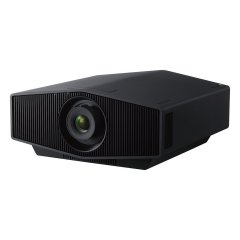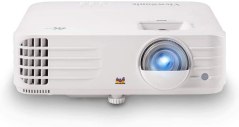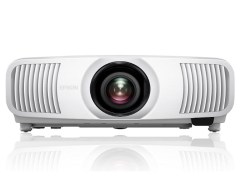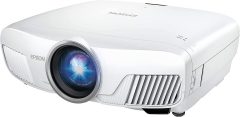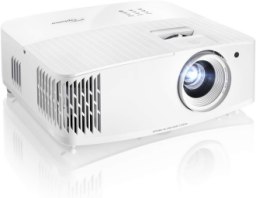Buying guide for Best 4K projectors
While most of the world is oohing and ahhing over 4K TVs, many home theater enthusiasts are pushing the envelope even further by building their home entertainment centers with 4K home theater projectors.
These projectors display the crisp, astonishing picture of 4K content at sizes TVs can’t touch, so if you’ve ever dreamed of building your own home theater with a 100-inch screen, there’s never been a better time to get started.
Let there be light: 4K projector bulb technologies
When you first start looking for a 4K projector, you may notice that there are a few acronyms that are important but can soon get confusing. Here are the three key 4K projector technologies you need to know about to make an informed decision.
DLP: Short for “digital light processing,” this is a technology that’s based on microscopic mirrors. DLP projectors usually feature bulbs that can last anywhere between 2,000 and 5,000 hours. These projectors are strong performers, typically with excellent 3D support, and the preferred option for home theater enthusiasts.
LCD: These projectors use liquid crystal displays to create the image that gets projected. LCD projectors are popular because they’re much more affordable than DLP projectors. However, these require frequent filter maintenance, and some users complain that dark colors aren’t represented accurately. If you need an affordable option that will perform admirably without being the best available, an LCD projector is a good choice.
- LED: These projectors use light-emitting diodes, and much like regular LED lightbulbs, projectors with LED bulbs last much longer – sometimes up to 20,000 hours. LED-based projectors require no maintenance, but they do have an Achilles’ heel: they’re not as bright as DLP or LCD models. LED projectors are ideal for small- to medium-size rooms and users who prefer maintenance-free setup.
One of the first things we look at when building a shortlist of top 4K projectors is how bright each one gets.
To help readers find the best 4K projector for their setup, we consider the size of each projector and the mounting options it offers.
Our search for quality 4K projectors starts with the most dependable brand names. Projectors from highly ranked companies tend to offer the best image quality and longest-lasting hardware.
We look closely at specifications like contrast ratio and color gamut to determine which 4K projectors are best for a quality home theater experience.
We appreciate 4K projectors that are easy to use. In fact, user-friendliness is one of our top considerations.
When determining which 4K projectors are the most effective, we look at the range and effectiveness of calibration features like keystone and vertical shift adjustment.
We consider the best 4K projectors in a variety of categories, including short-throw projectors and those that use lasers for a bright and focus-free experience.
Peak refresh rate and general motion handling are two things we consider when recommending the best 4K projectors for gaming and watching fast-paced content, like sports.
We carefully note how well each 4K projector displays HDR content, keeping an eye out for deep blacks and subtle highlights.
We make a point to determine what kind of projection technology each 4K projector uses, noting whether it uses true 4K or simulated 4K via pixel shifting.
Specs to impress: key 4K projector features
It can be difficult to stand out in the crowded 4K projector market, so many manufacturers have begun to include innovative new features to help differentiate their best models. If you’re looking for a 4K projector that can go the extra mile, keep an eye out for models with these features.
Lens shift: Occasionally, you’ll need to adjust your projector’s image to make sure the picture isn’t crooked or change the height of the picture. Lens shift is a feature that allows you to adjust the lens and screen placement without physically adjusting the projector. This is a huge convenience because manual lens adjustments can be clunky and imprecise.
Wireless HDMI: Depending on where you place your 4K projector, you might end up with a tripping hazard: a long HDMI cable snaking around your viewing area. If you’re ready to ditch cables entirely, opt for a 4K projector that supports wireless HDMI – a new technology that can transmit a video signal from any HDMI source like a cable box or streaming box without the need for an extended wire.
Video upscaling: Chances are good that not all of your content will be in 4K, so it’s important to get a projector that can make your lower-resolution TV and movies look as good as they can. All 4K projectors are able to stretch older content to a 4K image size, but some projectors include video upscaling technology to improve the original image through post-processing. If you have a lot of DVD or Blu-ray content, or if you’ll mostly be using your 1080p cable box, buy a 4K projector that includes video upscaling.
Did you know?
The brightness of projector bulbs is measured in lumens. Most 4K projectors use bulbs that are between 2,000 and 4,000 lumens. Different projectors use various bulbs based on their brightness and the throw of an image.
STAFF
BestReviews
Essential 4K projector accessories
Setting up your viewing area for a projector will require a few essential add-ons, so make sure to look for these when choosing a 4K projector.
Projector screen or projector screen paint
You’ll need a screen for your projected image, and there are hundreds of different options available. If you have room for a projector screen, buy one that can be pulled down from the ceiling. If you don’t have room for a dedicated screen, consider using projector paint on a bare wall. Projector paint creates a reflective surface that’s ideal for a minimalist setup.
Extra bulbs
Most 4K projector bulbs will last hundreds (and sometimes thousands) of hours before they burn out, but eventually, every bulb will burn out. Keep at least one spare bulb around at all times so you don’t have to wait for a replacement to arrive when your first bulb goes out.
Extra-long HDMI cable
Chances are good that you’ll want to place your projector behind your main seating or on the ceiling. If that’s the case, you’ll need an extra-long HDMI cable to connect your projector to a video source.
Grab one that’s longer than you think you’ll need. It never hurts to have the extra flexibility in case your placement plans change.
Audio solution
One thing that most 4K projector marketing materials leave out is that the projector speakers are usually terrible. That’s by design. Most projectors are made to be positioned far from the viewer, so they’re built on the assumption that you’ll be providing your own audio solution.
Whether it’s a soundbar or a full surround-sound setup, make sure you’ve got a plan for making your TV and movies sound as good as they look.
Expert Tip
Want a 4K projector but are short of room? You can buy an ultra-short-throw (UST) projector, designed to sit directly under the screen. They’re expensive, but are ideal where mounting a traditional projector isn’t possible.
STAFF
BestReviews
4K projector prices
The 4K projector market can be tricky because high prices don’t always equal high quality. As you’re looking for your 4K projector, keep these price ranges in mind.
Inexpensive
Between $1,500 and $1,999, you’ll find the best bang for your buck: projectors that deliver incredible 4K images, include cutting-edge features like high dynamic range (HDR), and come from brands you know. The only drawback is that projectors in this price range don’t use the brightest bulbs available, making them only appropriate for average-size viewing areas. If you’re looking to add a projector to a typical living room, you don’t need to spend more than this, but if you’re building a proper home theater of 1,000 square feet or more, you’ll need to spend more to get a projector that’s powerful and bright enough for the room.
Mid-range
Between $2,000 and $2,999, expect to see projectors that include brighter bulbs and luxury features. If you have a small- to moderate-size viewing space, but you absolutely must have high-end options like wireless HDMI, expect to spend at least this much.
Expensive
At $3,000 and up, you’ll find 4K projectors designed for large, uncompromising home theaters. The projectors in this range are enormous, bright enough for auditoriums, and include just about every feature available. If you’re looking to invest in a powerhouse 4K projector for an extra-large space, and you absolutely need every last feature from HDR to 3D, it won’t be cheap.
Tips
Buy a ceiling mount for your 4K projector. Ceiling mounts are an affordable and easy way to keep your 4K projector out of harm’s way. The best part is when your 4K projector is mounted to the ceiling, people can walk about the room freely without having to worry about their shadow blocking the picture.
Make sure your 4K projector is plugged into a power outlet with surge protection. Projector bulbs are incredibly expensive, so you want to make sure that yours never burn out when a power surge strikes. Buy a robust power strip that includes surge protection. And if you’re particularly worried about protecting your investment, find one that ensures damage to connected devices in the event of a problem.
Read user reviews about how loud each 4K projector model is when running. All projector bulbs get hot – they are lightbulbs, after all. Most projectors have a built-in fan that kicks in when things get too hot, and those fans can generate a decent amount of noise. If you’re concerned about your projector fan being a distraction while you watch TV and movies, read user reviews to determine which models are acceptably quiet and which are too loud.
FAQ
Q. How dark does a room need to be for a projected image to look good? Will I still be able to see the image if the lights are on?
A. Most projectors look good – but not great – in fully lit rooms. If you use a projector in a room with a lot of windows or artificial light, you’ll be able to see what’s going on, but the edges of the picture may be fuzzy, and not all of the detail will be as visible. If you’re getting a 4K projector for a room that has a lot of light, consider investing in blackout curtains to create optimal lighting conditions when you need them.
Q. Is it difficult to install a projector mount?
A. Depending on the model, installing a projector mount can be moderately challenging. If you’re comfortable using a stud finder, drilling pilot holes, and following directions to the letter, you’ll be fine installing a projector mount yourself. If you’ve never attempted to mount anything before, call a professional for help.
Q. How big of a screen should I get for my 4K projector?
A. Most 4K projectors have a sweet spot around 100 inches, although high-end models support even larger screens. If you plan on going larger, buy a projector that includes a bulb that’s at least 3,000 lumens, and be prepared to pay a few thousand dollars more.


